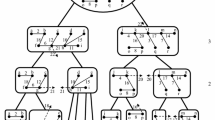Abstract
Self-stabilization is a versatile approach to fault-tolerance since it permits a distributed system to recover from any transient fault that arbitrarily corrupts the contents of all memories in the system. Byzantine tolerance is an attractive feature of distributed systems that permits to cope with arbitrary malicious behaviors. This paper focuses on systems that are both self-stabilizing and Byzantine tolerant. Combining these two properties is known to induce many impossibility results. Hence, there exist several fault tolerance schemes to contain Byzantine faults in self-stabilization. In this paper, we consider the well known problem of constructing a maximum metric tree in this context. We provide a new distributed protocol that ensures the best possible containment with respect to topology-aware strict and strong stabilization.





Similar content being viewed by others
References
Afek, Y., Kutten, S., Yung, M.: Memory-efficient self stabilizing protocols for general networks. In: 4th International Workshop on Distributed Algorithms (WDAG 1990), pp. 15–28 (1990)
Blin, L., Butelle, F.: The first approximated distributed algorithm for the minimum degree spanning tree problem on general graphs. Int. J. Found. Comput. Sci. 15(3), 507–516 (2004)
Blin, L., Potop-Butucaru, M., Rovedakis, S.: A superstabilizing log( )-approximation algorithm for dynamic steiner trees. In: 11th International Symposium on Stabilization, Safety, and Security of Distributed Systems (SSS 2009), pp. 133–148 (2009)
Blin, L., Potop-Butucaru, M., Rovedakis, S.: Self-stabilizing minimum degree spanning tree within one from the optimal degree. J. Parallel Distrib. Comput. 71(3), 438–449 (2011)
Burman, J., Kutten, S.: Time optimal asynchronous self-stabilizing spanning tree. In: 21st International Symposium on Distributed Computing (DISC 2007), pp. 92–107 (2007)
Butelle, F., Lavault, C., Bui, M.: A uniform self-stabilizing minimum diameter tree algorithm (extended abstract). In: 9th International Workshop on Distributed Algorithms (WDAG 1995), pp. 257–272 (1995)
Chen, G.H., Houle, M.E., Kuo, M.T.: The steiner problem in distributed computing systems. Inf. Sci. 74(1–2), 73–96 (1993)
Collin, Z., Dolev, S.: Self-stabilizing depth-first search. Inf. Process. Lett. 49(6), 297–301 (1994)
Daliot, A., Dolev, D.: Self-stabilization of byzantine protocols. In: 7th International Symposium on Self-Stabilizing Systems (SSS 2005), pp. 48–67 (2005)
Datta, A.K., Johnen, C., Petit, F., Villain, V.: Self-stabilizing depth-first token circulation in arbitrary rooted networks. Distrib. Comput. 13, 207–218 (2000)
Delaët, S., Ducourthial, B., Tixeuil, S.: Self-stabilization with r-operators revisited. J. Aerosp. Comput. Inf. Commun. 3(10), 498–514 (2006)
Dijkstra, E.W.: Self-stabilizing systems in spite of distributed control. Commun. ACM 17(11), 643–644 (1974)
Dolev, S.: Self-stabilization. MIT Press, Cambridge (2000)
Dolev, S., Welch, J.L.: Self-stabilizing clock synchronization in the presence of byzantine faults. J. ACM 51(5), 780–799 (2004)
Dolev, S., Israeli, A., Moran, S.: Self-stabilization of dynamic systems assuming only read/write atomicity. In: 9th Annual ACM Symposium on Principles of Distributed Computing (PODC 1990), pp. 103–117 (1990)
Dolev, S., Israeli, A., Moran, S.: Self-stabilization of dynamic systems assuming only read/write atomicity. Distrib. Comput. 7(1), 3–16 (1993)
Dubois, S., Masuzawa, T., Tixeuil, S.: The impact of topology on byzantine containment in stabilization. In: 24th International Symposium on Distributed Computing (DISC 2010) (2010a)
Dubois, S., Masuzawa, T., Tixeuil, S.: On byzantine containment properties of the min+1 protocol. In: 12th International Symposium on Stabilization, Safety, and Security of Distributed Systems (SSS 2010) (2010b)
Dubois, S., Masuzawa, T., Tixeuil. S.: Maximum metric spanning tree made byzantine tolerant. In: 25th International Symposium on Distributed Computing (DISC 2011) (2011)
Dubois, S., Masuzawa, T., Tixeuil, S.: Bounding the impact of unbounded attacks in stabilization. IEEE Trans. Parallel Distrib. Syst. 23(3), 460–466 (2012)
Ducourthial, B., Tixeuil, S.: Self-stabilization with r-operators. Distrib. Comput. 14(3), 147–162 (2001)
Ducourthial, B., Tixeuil, S.: Self-stabilization with path algebra. Theor. Comput. Sci. 293(1), 219–236 (2003)
Gallager, R.G., Humblet, P.A., Spira, P.M.: A distributed algorithm for minimum-weight spanning trees. ACM Trans. Program. Lang. Syst. 5(1), 66–77 (1983)
Gärtner, F.C.: A survey of self-stabilizing spanning-tree construction algorithms. Technical report ic/2003/38, EPFL (2003)
Gouda, M.G., Schneider, M.: Maximum flow routing. In: Joint Conference on Information Sciences (JCIS 1994) (1994)
Gouda, M.G., Schneider, M.: Stabilization of maximal metric trees. In: ICDCS Workshop on Self-stabilizing Systems (WSS 1999), pp. 10–17 (1999)
Gouda, M.G., Schneider, M.: Maximizable routing metrics. IEEE/ACM Trans. Netw. 11(4), 663–675 (2003)
Huang, S.T., Chen, N.S.: A self-stabilizing algorithm for constructing breadth-first trees. Inf. Process. Lett. 41(2), 109–117 (1992)
Huang, S.T., Wuu, L.C.: Self-stabilizing token circulation in uniform networks. Distrib. Comput. 10(4), 181–187 (1997)
Huang, T.C., Lin, J.C.: A self-stabilizing algorithm for the shortest path problem in a distributed system. Comput. Math. Appl. 43(1–2), 103–109 (2002)
Lamport, L., Shostak, R.E., Pease, M.C.: The byzantine generals problem. ACM Trans. Program. Lang. Syst. 4(3), 382–401 (1982)
Masuzawa, T., Tixeuil, S.: Stabilizing link-coloration of arbitrary networks with unbounded byzantine faults. Int. J. Princ. Appl. Inf. Sci. Technol. 1(1), 1–13 (2007)
Nesterenko, M., Arora, A.: Tolerance to unbounded byzantine faults. In: 21st Symposium on Reliable Distributed Systems (SRDS 2002), pp. 22–29. IEEE Computer Society (2002)
Schneider, M.: Flow routing in computer networks. PhD thesis, University of Texas at Austin (1997)
Tixeuil, S.: Self-stabilizing algorithms. Applied algorithms and data structures. Algorithms and Theory of Computation Handbook, 2nd edn, pp. 26.1–26.45. CRC Press, Taylor & Francis Group, Boca Raton (2009)
Tsai, M.S., Huang, S.T.: A self-stabilizing algorith for the shortest paths problem with a fully distributed demon. Parallel Process. Lett. 4, 65–72 (1994)
Acknowledgments
This work is supported in part by ANR projects SHAMAN, ALADDIN and SPADES and by Global COE (Centers of Excellence) Program of MEXT and Grant-in-Aid for Scientific Research (B)22300009 of JSPS
Author information
Authors and Affiliations
Corresponding author
Rights and permissions
About this article
Cite this article
Dubois, S., Masuzawa, T. & Tixeuil, S. Maximum Metric Spanning Tree Made Byzantine Tolerant. Algorithmica 73, 166–201 (2015). https://doi.org/10.1007/s00453-014-9913-5
Received:
Accepted:
Published:
Issue Date:
DOI: https://doi.org/10.1007/s00453-014-9913-5




